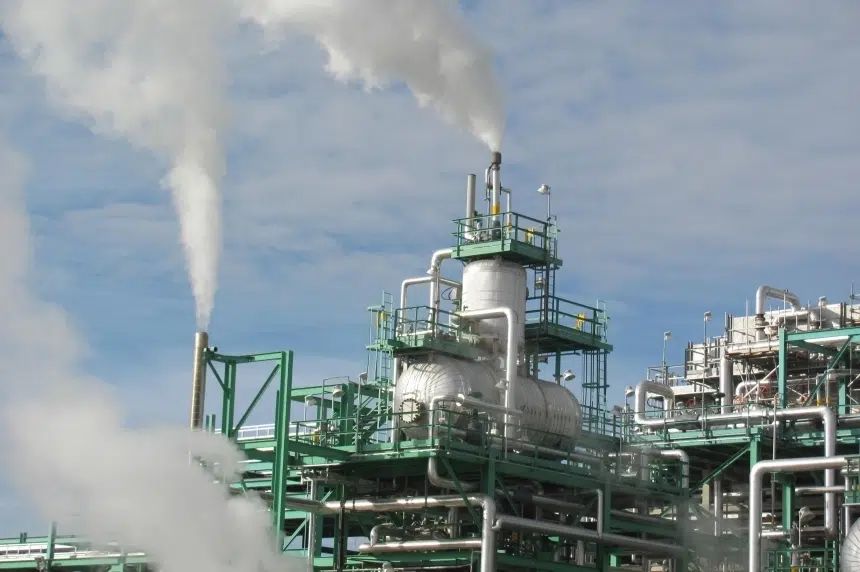Concerns over fatigue and potentially less-experienced workers have an associate professor at the University of Regina watching the workers’ dispute at the Co-op Refinery closely.
The workers’ union — Unifor Local 594 — issued strike notice, to take effect at 4:30 p.m. on Thursday, while the refinery has issued a lockout notice, to take effect at 5:30 p.m. the same day.
Sean Tucker is an associate professor in the faculty of business administration at the University of Regina. His background is in health and safety and he has been studying safety at the refinery for the past five years.
He said the prospect of a lockout at the refinery is concerning, especially if it lasts for days or even weeks.
“That will have the effect of increasing the risk of an incident at the refinery, in my opinion, due to worker fatigue, (and) relatively less-experienced workers at the refinery,” said Tucker.
He said with workers and managers living in a work camp on the refinery grounds, there will be tension at play as well.
Tucker has concerns about explosions, fires, and releases of vapours from the site. He said there is a history of incidents, large and small, at the refinery even with experienced workers. And small incidents can become big.
“That’s where that expertise comes into play, about knowing to lock down something quick, and shut valves off, and get on top of things quickly — and you layer in fatigue, and how is that going to affect response? Even with experienced workers at that site, there have still been incidents in the past,” said Tucker.
For its part, in previous statements made about the dispute, the refinery has said its business continuity plan — including an onsite work camp — will help ensure the safe operation of the refinery, and it will have contract workers and “highly trained managers” running things.
Contract negotiations
The sticking point in the talks seems to be around the pension plan. During the last round of talks, in 2017, the union agreed to let the refinery put new workers into a defined contribution pension plan, but let already-established workers continue on with their defined benefit plan.
In a defined benefit plan, what a worker gets for their pension at the end of things is guaranteed, whereas in a defined contribution plan, the worker and company both contribute and what the worker ends up getting out of it depends on the market and investments.
Tucker said the union seems to have considered that a pretty big concession, so now it’s frustrated with the refinery which now wants to change the defined benefits plan and have the established workers start contributing to it if they want to stay under defined benefits.
“(The union’s) position is, ‘If we make another concession this round here, when is this going to end? We’re going to be giving concessions each round of bargaining going forward. And we have agreed to certain things, and we have a dangerous job, and we’ve experienced a lot of things over the years in terms of exposure to dangers, explosions, fires, leaks, and we’re entitled to this type of pension,’ ” explained Tucker.
The company has said that the future of refining is uncertain, so it has to make changes to adapt. The switch-over from defined benefits to defined contributions has been a sticking point in labour disputes for many companies and public entities in recent years.
Animosity in negotiations
Tucker’s concern, though, is with this much frustration coming out of the negotiations, the employer-employee atmosphere at the plant won’t be great even when a deal is reached, and that could create possible public safety concerns into the long term.
“What’s safety going to be like, then, going back into that environment if they have a long, protracted, very negative lockout? What’s communication going to be like? What’s the level of trust going to be like at that plant? Probably not very good, and that type of situation is not good for managing in a safety-sensitive environment,” he said.
The minister of labour relations has said he’s watching the dispute closely, and Tucker said the minister could step in but would likely be reluctant to override free collective bargaining.
Tucker said he’s disappointed in what he calls the company’s lack of communication on public safety. He ran a town hall on the question of safety in the event of a strike a few weeks ago, and said the refinery didn’t participate.
He also finds some of the statements and promises the company has made suspect, saying he has reason to question them.
Tucker said he’s not trying to be alarmist, but this is a serious matter and he thinks the public should be paying attention to it. He suggested that Co-op members and community leaders should contact the company and let them know they want an agreement to be reached.
And in future, Tucker said the two sides need to find a better way to settle their disagreements.
“What happens when they have their next contract agreement? Is this how they’re going to settle it each time, (to) have strike votes (or) lockout notices? And are we going to have to live through this each time? The public is bearing a lot of risk in this situation,” said Tucker.











